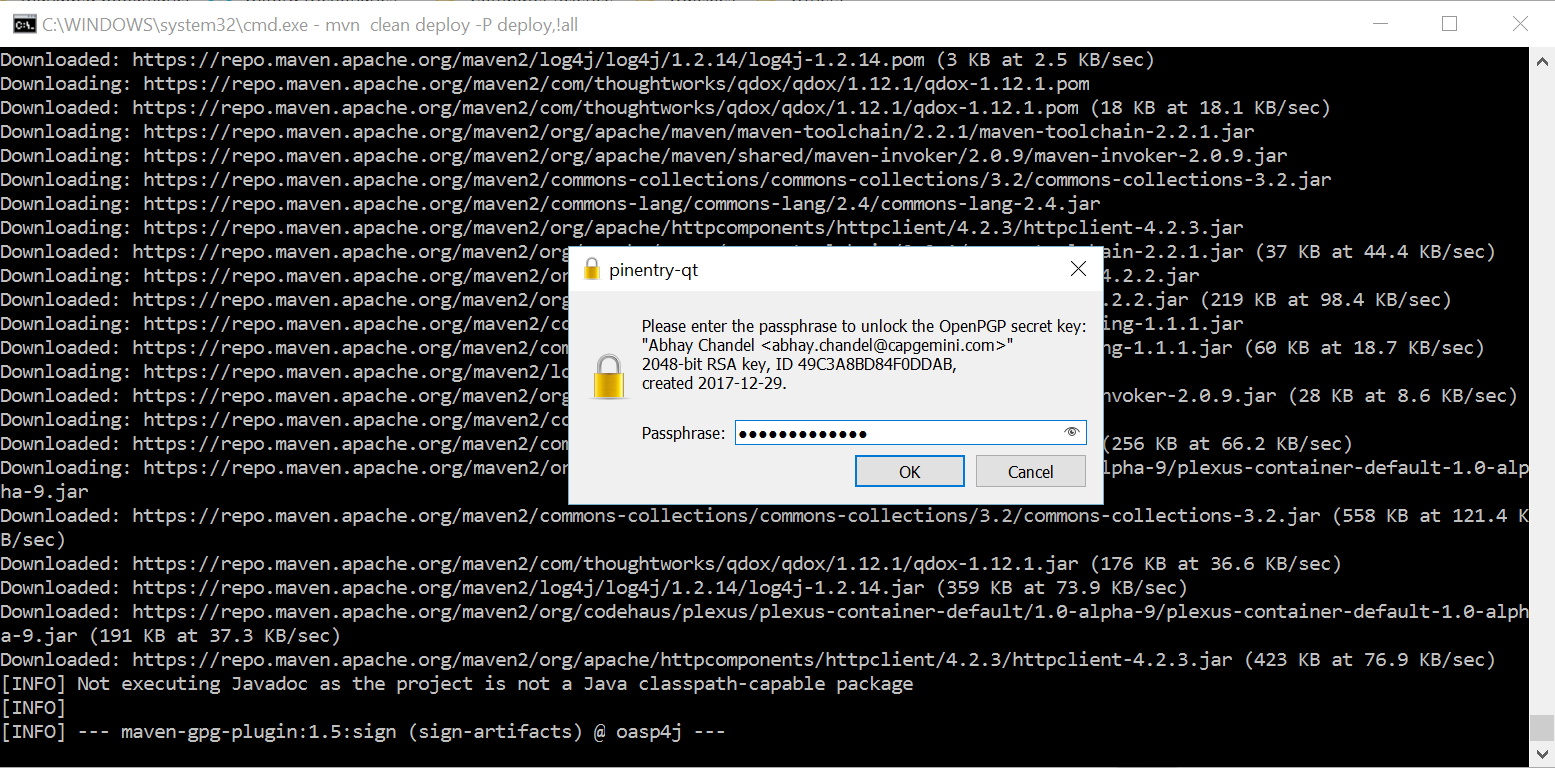-
Notifications
You must be signed in to change notification settings - Fork 88
devonfw release
This page documents how to create and publish a release of devon4j.
For each release there is a milestone that contains an issue for creating the release itself (the github issue of that issue is referred as «issue»). The release version is referred as «x.y.z».
To release the code follow these steps.
-
Create a clean clone of the repository:
git clone https://github.com/devonfw/devon4j.git
-
In case you want to build a (bug fix) release from a different branch, switch to that branch:
git checkout -b develop-«x.y» origin/develop-«x.y»
-
Ensure your branch is up-to-date:
git pull
-
Ensure that the result is what you want to release (
mvn clean install). -
Bump the release version by removing the
-SNAPSHOTfromdevon4j.versionproperty in top-levelpom.xml. -
Create an annotated tag for your release:
git tag -a release/x.y.z -m "#«issue»: tagged x.y.z"e.g For release 2.5.0 the command would look like
git tag -a release/2.5.0 -m "#618: tagged 2.5.0"where #618 is the issue number created for release itself under release milestone. You can confirm if the tag is created by listing out the tags with the following command
git tag
For publishing artifacts to OSSRH, we need an OSSRH account with necessary rights for publishing and managing staging repositories. And configure this account in devonfw distribution to create connection and deploy to OSSRH.
-
If you do not already have an account on OSSRH, create an account on the link below https://issues.sonatype.org/secure/Signup!default.jspa
-
You need manager access to deploy artifacts to OSSRH. For same contact devonfw administrators for OSSRH.
-
Open file
conf/.m2/setting.xmlin your devon distribution (devon-ide) and add a new server with following detailsHere<server> <id>ossrh</id> <username>«ossrh_username»</username> <password>«ossrh_password»</password> </server>
«ossrh_username»and«ossrh_password»are the account details used to login into OSSRH and should have rights to publish artifacts to OSSRH forgroupIdnamecom.devonfw(and its children). Please use password encryption and prevent storing passwords in plain text. The idossrhpoints to the OSSRH repository for snaphost and release declared in the<distributionManagement>section of thedevon4j/pom.xml. -
Optionally you may want to explicitly define PGP key via the associated email-address:
<profile> <id>devon.ossrh</id> <activation> <activeByDefault>true</activeByDefault> </activation> <properties> <gpg.keyname>[email protected]</gpg.keyname> </properties> </profile>
Artifacts should be PGP signed before they can be deployed to OSSRH. Artifacts can be signed either by using command line tool GnuPG or GUI based tool Gpg4win Kleopetra (preferred). Follow the steps below to sign artifacts using either of the two tools.
-
Download tools GnuPg - https://www.gnupg.org/download/ gpg4win - https://www.gpg4win.org/download.html
-
Installation Installation is self explanatory for GnuPG and gpg4win. To verify installation of GnuPg, open windows command line and run "gpg --version or gpg2 --version"
-
Generate PGP key pair for signing artifacts.
|
Note
|
Remember the passphrase set for PGP keys as it will be used later for authentication during signing of artifacts by maven. |
Using GnuPg follow either of the link below
Using Kleopetra follow link below
Exporting PGP key to public key-server
Using GnuPg - http://central.sonatype.org/pages/working-with-pgp-signatures.html#distributing-your-public-key
Using Kleopetra, click on the certificate entry you want to publish to OpenPGP certificate servers and select File > Publish on Server as shown below. These instructions are as per Kleopatra 3.0.1-gpg4win-3.0.2, for latest versions there might be some variation.
-
Go to the root of devon4j project and run following command. Make sure there are no spaces between comma separated profiles.
mvn clean deploy -P deploy
-
A pop will appear asking for passphrase for PGP key. Enter the passphrase and press "OK".
|
Note
|
If you face the error below, contact one of the people who have access to the repository for access rights. |
-
Open OSSRH, login and open staging repositories.
-
Find your deployment repository as
comdevonfw-NNNNand check itsContent. -
Then click on
Closeto close the repository and wait a minute. -
Refresh the repository and copy the URL.
-
Create a vote for the release and paste the URL of the staging repository.
-
After the vote has passed with success go back to OSSRH and and click on
Releaseto publish the release and stage to maven central. -
Edit the top-level
pom.xmland changedevon4j.versionproperty to the next planned release version including the-SNAPSHOTsuffix. -
Commit and push the changes:
git commit -m "#«issue»: open next snapshot version" git push -
In case you build the release from a branch other that
developensure to follow the next steps. Otherwise you are done here and can continue to the next section. To merge the changes (bug fixes) onto develop do:git checkout develop git merge develop-«x.y»
-
You most probably will have a conflict in the top-level
pom.xml. Then resolve this conflict. In any case edit thispom.xmland ensure that it is still pointing to the latest plannedSNAPSHOTfor thedevelopbranch. -
If there are local changes to the top-level
pom.xml, commit them:git commit -m "#«issue»: open next snapshot version" -
Push the changes of your
developbranch:git push
-
Create a new folder for your version in your checkout of devonfw.github.io/devon4j (as
«x.y.z»). -
Copy the just generated
devon4j-doc.pdfinto the new release version folder. -
Copy the
index.htmlfrom the previous release to the new release version folder. -
Edit the new copy of
index.htmland replace all occurrences of the version to the new release as well as the release date. -
Generate the maven site from the
devon4jrelease checkout (see code release):mvn site mvn site:deploy
-
Review that the maven site is intact and copy it to the new release version folder (from
devon4j/target/devon4j/maventodevonfw.github.io/devon4j/«x.y.z»/maven). -
Update the link in the
devon4j/index.htmlto the latest stable documentation. -
Add, commit and push the new release version folder.
git add «x.y.z» git commit -m "devonfw/devon4j#«issue»: released documentation" git push
This documentation is licensed under the Creative Commons License (Attribution-NoDerivatives 4.0 International).



